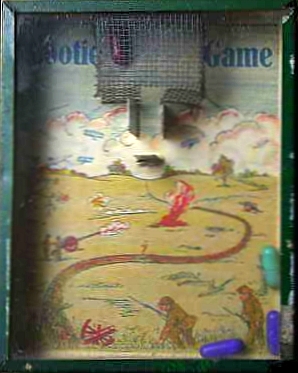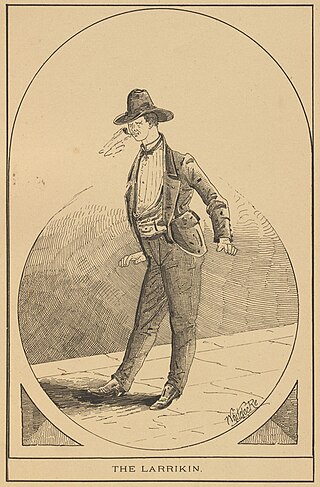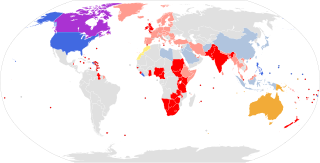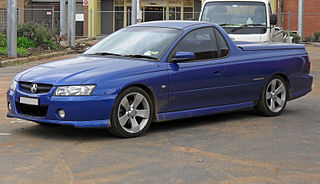
Rhyming slang is a form of slang word construction in the English language. It is especially prevalent among Cockneys in England, and was first used in the early 19th century in the East End of London; hence its alternative name, Cockney rhyming slang. In the US, especially the criminal underworld of the West Coast between 1880 and 1920, rhyming slang has sometimes been known as Australian slang.

A vice is a practice, behaviour, or habit generally considered morally wrong in the associated society. In more minor usage, vice can refer to a fault, a negative character trait, a defect, an infirmity, or a bad or unhealthy habit. Vices are usually associated with a fault in a person's character or temperament rather than their morality.

Cooties is a fictitious childhood disease, commonly represented as childlore. It is used in the United States, Canada, Australia, New Zealand, and the Philippines as a rejection term and an infection tag game. It is similar to the British 'dreaded lurgi', and to terms used in the Nordic countries, in Italy, India and Iraq. A child is said to "catch" cooties through close contact with an "infected" person or from an opposite-sex child of a similar age.
This glossary of names for the British include nicknames and terms, including affectionate ones, neutral ones, and derogatory ones to describe British people, Irish People and more specifically English, Welsh, Scottish and Northern Irish people. Many of these terms may vary between offensive, derogatory, neutral and affectionate depending on a complex combination of tone, facial expression, context, usage, speaker and shared past history.

Wanker is slang for "one who wanks (masturbates)", but is most often used as a general insult. It is a pejorative term of English origin common in Britain and other parts of the English-speaking world, including Ireland, Australia and New Zealand. It is synonymous with the insult tosser.
A hypocorism, or pet name, is a name used to show affection for a person. It may be a diminutive form of a person's name, such as Izzy for Isabel or Bob for Robert, or it may be unrelated.
Haram is an Arabic term meaning 'forbidden'. This may refer to either something sacred to which access is not allowed to the people who are not in a state of purity or who are not initiated into the sacred knowledge; or, in direct contrast, to an evil and thus "sinful action that is forbidden to be done". The term also denotes something "set aside", thus being the Arabic equivalent of the Hebrew concept חרם (ḥērem) and the concept of sacer in Roman law and religion. In Islamic jurisprudence, haram is used to refer to any act that is forbidden by Allah and is one of the five Islamic commandments that define the morality of human action.

Larrikin is an Australian English term meaning "a mischievous young person, an uncultivated, rowdy but good-hearted person", or "a person who acts with apparent disregard for social or political conventions".
Australian English is a major variety of the English language spoken throughout Australia. Most of the vocabulary of Australian English is shared with British English, though there are notable differences. The vocabulary of Australia is drawn from many sources, including various dialects of British English as well as Gaelic languages, some Indigenous Australian languages, and Polynesian languages.

Despite the various English dialects spoken from country to country and within different regions of the same country, there are only slight regional variations in English orthography, the two most notable variations being British and American spelling. Many of the differences between American and British or Commonwealth English date back to a time before spelling standards were developed. For instance, some spellings seen as "American" today were once commonly used in Britain, and some spellings seen as "British" were once commonly used in the United States.
Stuart Forbes Macintyre was an Australian historian, and Dean of the Faculty of Arts at the University of Melbourne from 1999 to 2008. He was voted one of Australia's most influential historians.
In UK English, Mufti is plain or ordinary clothes, especially when worn by one who normally wears, or has long worn, a military or other uniform, such as a school uniform. It is also called civies and civvies.
A pantomath is a person who wants to know or knows everything. The word itself is not to be found in common online English dictionaries, the OED, dictionaries of obscure words, or dictionaries of neologisms.

The origin of the word jazz is one of the most sought-after etymologies in modern American English. Interest in the word – named the Word of the Twentieth Century by the American Dialect Society – has resulted in considerable research and the linguistic history is well documented. "Jazz" originated in slang around 1912 on the West Coast. The meaning varied, but the word did not initially refer to music. "Jazz" came to mean jazz music in Chicago around 1915.
Bloke is a slang term for a common man in the United Kingdom, Ireland, Australia, New Zealand and South Africa.

Diminutive forms of words are commonly used in everyday Australian English. While many dialects of English make use of diminutives and hypocorisms, Australian English uses them more extensively than any other. Diminutives may be seen as slang, but many are used widely across the whole of society. Some forms have also spread outside Australia to other English-speaking countries. There are over 5,000 identified diminutives in use in Australian English.

Teetotalism is the practice or promotion of total personal abstinence from the consumption of alcohol, specifically in alcoholic drinks. A person who practices teetotalism is called a teetotaler (US) or teetotaller (UK), or is simply said to be teetotal. Globally, almost half of adults do not drink alcohol. A number of temperance organisations have been founded in order to promote teetotalism and provide spaces for non-drinkers to socialise.








